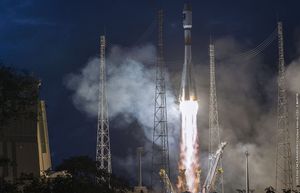



Date:19/12/15
 Two more satellites joined Europe’s Galileo navigation fleet in orbit Thursday after launch from French Guiana aboard a Soyuz rocket, the European Space Agency (ESA) reports.
Two more satellites joined Europe’s Galileo navigation fleet in orbit Thursday after launch from French Guiana aboard a Soyuz rocket, the European Space Agency (ESA) reports.
The two satellites, the 11th and 12th spacecraft in the Galileo constellation, blasted off at 1151:56 GMT (6:51:56 a.m. EST) from the Guiana Space Center in South America, giving the system a dozen of its planned 30 members as the European Commission begins ordering eight more satellites to complete construction of the multibillion-dollar network.
The high-altitude satellite deployment concluded the third Soyuz launch for the Galileo navigation program this year, doubling the number of satellites in the fleet in the process. It was the 13th Soyuz launch from French Guiana under the commercial auspices of Arianespace since the rocket’s debut there in November 2011.
Analogue of the Russian GLONASS and American GPS design of the system was developed by the European Space Agency, with the support of the EU. Work on Galileo began in 2000.
The final formation of the orbital constellation Galileo, according to the plans of the European experts, should be completed in 2020. By that time, 24 satellites will be placed in orbit for the full operation of the system. The next launch of Galileo satellites will take place during the second half of 2016, according to Russian New Agency.
Two European Galileo satellites put in orbit
 Two more satellites joined Europe’s Galileo navigation fleet in orbit Thursday after launch from French Guiana aboard a Soyuz rocket, the European Space Agency (ESA) reports.
Two more satellites joined Europe’s Galileo navigation fleet in orbit Thursday after launch from French Guiana aboard a Soyuz rocket, the European Space Agency (ESA) reports.The two satellites, the 11th and 12th spacecraft in the Galileo constellation, blasted off at 1151:56 GMT (6:51:56 a.m. EST) from the Guiana Space Center in South America, giving the system a dozen of its planned 30 members as the European Commission begins ordering eight more satellites to complete construction of the multibillion-dollar network.
The high-altitude satellite deployment concluded the third Soyuz launch for the Galileo navigation program this year, doubling the number of satellites in the fleet in the process. It was the 13th Soyuz launch from French Guiana under the commercial auspices of Arianespace since the rocket’s debut there in November 2011.
Analogue of the Russian GLONASS and American GPS design of the system was developed by the European Space Agency, with the support of the EU. Work on Galileo began in 2000.
The final formation of the orbital constellation Galileo, according to the plans of the European experts, should be completed in 2020. By that time, 24 satellites will be placed in orbit for the full operation of the system. The next launch of Galileo satellites will take place during the second half of 2016, according to Russian New Agency.
Views: 656
©ictnews.az. All rights reserved.Similar news
- Mobile operators of national market to reduce roaming tariffs
- Iran vows to unplug Internet
- China Targeting Telecoms in Corruption Probe
- Bangladesh to use electronic voting system for next elections
- Philippine IT sector to launch five-year digital strategy plan
- Russian Premier Vladimir Putin meets ITU Secretary-General Hamadoun Touré
- US lawmakers propose to regulate use of geolocation data
- Unlimited mobile data plans dying as telcos gear up for cloud future
- Europe at risk of falling behind US and Asia on 4G use
- Netherlands first to regulate on net neutrality
- Korean Co Takes Aim At Display Patents
- Regulators, Banks Look for IT Hires After Breakdowns
- Electron transactions spreading
- Schools in remote rural areas will connect to the single database via network without SIM
- Obama to Personally Tweet From Twitter Account





















